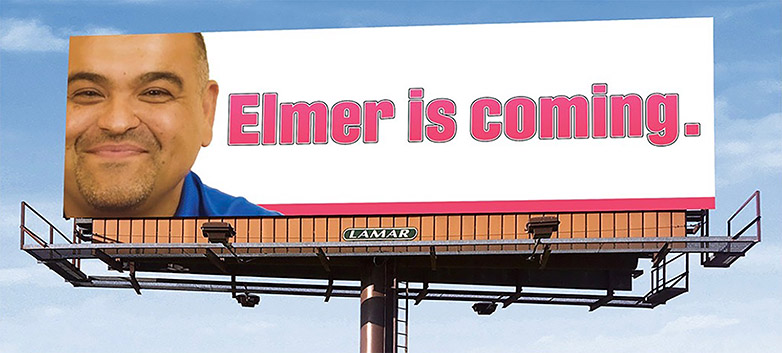Lately I’ve been trying to explain to uncomprehending faces how the most powerful opening lines are never questions, but statements that trigger more questions than they answer.
I am certain those uncomprehending faces are my fault. I fear the idea that I am trying to teach may be bigger than the teacher.
I am going to do my best today – one last time – to make it as clear as I can:
- The job of the opening line is to engage the reader, listener, or viewer.
- If the opening line doesn’t do it’s job, you risk becoming invisible.
- If your customer turns their attention away from you, you cease to exist.
The most famous opening line in literature is, “Call me Ishmael.” It is a simple 3-word statement, but it triggers the following questions:
“Is your name not Ishmael?”
“Why are you unwilling to tell us your real name?”
“And why did you choose the name ‘Ishmael’.”
“Are you hiding from someone?”
“And if so, why?”
The face on the billboard at the top of this page is a close friend of mine. The billboard contains no company name, no logo, no domain name, and no telephone number. We give you no clue that might allow you to answer the questions that swirl in your mind:
“Who is Elmer?”
“Why is he coming”
“What will he do when he gets here?”
“Did su madre really name him Elmer?”
As an ad, that billboard, “Elmer is Coming,” is woefully incomplete. In fact, every dilettante in the world of advertising will take great joy in pointing out that “only a moron” would put up such a billboard. It will be the talk of the town.
“What a stupid billboard! It doesn’t have a call-to-action and it doesn’t have any contact information or even a logo!”
But those billboards are only the opening salvo of an ad campaign that will continue for decades.
After 4 weeks, when the city is buzzing with “Who is Elmer?” my friend will introduce himself on the radio and share who he is, where he came from, and what he hopes to do. Everyone who hears those ads will be anxious to tell their friends all about Elmer.
What I am describing is not a “unique selling proposition.” It is simply a literary device, an artifact of truth upon which we can build a captivating ad, the beginning of a highly successful ad campaign.
You never get a second chance to make a good first impression.
Your first impression of Elmer is that he is easy-going and interesting and fun. (All of that is true, by the way.)
Both of the examples I gave you earlier were just three words.
Are you willing to try your hand at writing a 3-word statement that triggers more questions than it answers?
I am not talking about a 3-word caption that needs to be accompanied by an image. “Elmer is Coming” works its magic even without a picture. Likewise, “Call me Ishmael.”
Can you write a 3-word statement that triggers more questions than it answers? If your three words make Indy and me to want to know more, Indy said he will publish your name in next week’s rabbit hole.
Send your three words to indy@wizardofads.com before midnight Saturday, February 4th.
If you see your name in the rabbit hole the following Monday, that means you got an A+.
Roy H. Williams
 When a publishing house releases only one book a year, you know it will be a blockbuster. That’s always been the case with award-winning Bard Press, which has brought out 18 business bestsellers over the past 25 years. This year the boutique imprint has tapped authors Ed O’Malley and Julia Fabris McBride, whose book on leadership, due out this week, offers a revolutionary model that allows everyone to claim the mantle of “leader,” no matter how high up or low down they are on the organizational chart. As Ed and Julia explain to roving reporter Rotbart, anyone can lead, anytime, anywhere. Is it your turn to step up? MondayMorningRadio.com
When a publishing house releases only one book a year, you know it will be a blockbuster. That’s always been the case with award-winning Bard Press, which has brought out 18 business bestsellers over the past 25 years. This year the boutique imprint has tapped authors Ed O’Malley and Julia Fabris McBride, whose book on leadership, due out this week, offers a revolutionary model that allows everyone to claim the mantle of “leader,” no matter how high up or low down they are on the organizational chart. As Ed and Julia explain to roving reporter Rotbart, anyone can lead, anytime, anywhere. Is it your turn to step up? MondayMorningRadio.com
